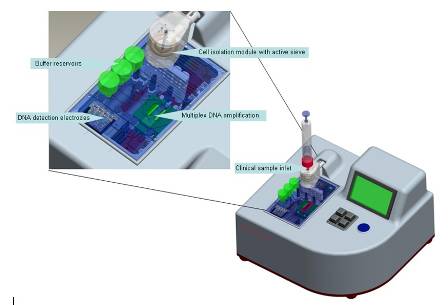MIRACLE project launched to develop lab-on-chip for cancer diagnosis
3 Sept 2010
The EU funded MIRACLE project, launched on 1 September, aims to develop an operational lab-on-chip for the isolation and detection of circulating and disseminated tumour cells (CTCs and DTCs) in blood.
The lab-on-chip technology is seen as an essential step towards faster and cheaper diagnosis of cancer.
Detection of circulating and disseminated tumour cells in blood is a promising methodology to diagnose cancer dissemination or to follow up cancer patients during therapy.
At the moment, the detection analyses of these cells are performed in medical laboratories requiring labour intensive, expensive and time-consuming sample processing and cell isolation steps. A full tumour cell detection analysis can take more than a day. A lab-on-chip, integrating the many processing steps, would enable a faster, easy-to-use, cost-effective detection of tumour cells in blood. They are therefore labour-saving and minimally invasive, increasing the patient’s comfort and the efficiency of healthcare.

Schematic illustration of the envisaged
MIRACLE smart miniaturized system with integrated microfluidic
cartridges to enable tumour cell characterization and counting
directly from clinical samples. Credit: Institut für Mikrotechnik Mainz.
(text in image clockwise from top right: Cell isolation module
with active sieve; Multiplex DNA amplification; Clinical sample
inlet; DNA detection electrodes; Buffer reservoirs)
In a preceding joint project involving some of the partners (MASCOT, funded under the EU 6th Framework Programme FP6-027652), individual microfluidic modules for cell isolation, cell counting, DNA amplification and detection have been developed. Based on this expertise and strengthened by additional partners, the development of a fully automated, lab-on-chip platform to isolate, count and genotype CTCs is envisaged within the framework of the MIRACLE project.
For genotyping, genetic material (eg mRNA) will be extracted from the cells and multiple cancer-related markers will be amplified based on multiplex ligation dependent probe amplification (MLPA) followed by their detection using an array of electrochemical sensors.
Full integration of all steps requires innovative research and processing steps that need a combination of the multidisciplinary and unique expertise of the different project partners (ranging from microfluidics to interfacing, miniaturization, and integration skills). The resulting lab-on-chip tumour detection system will be well ahead of the current state-of-the-art, revolutionizing cancer diagnostics and individualized theranostics.
The MIRACLE project members consist of: imec as project co-ordinator, the Universitat Rovira I Virgili (Spain), the Institut für Mikrotechnik Mainz, AdnaGen, ThinXXs and Consultech (Germany), MRC Holland (The Netherlands), the Oslo University Hospital (Norway), the KTH Royal Institute of Technology, Multi-D and Fujirebio Diagnostics (Sweden), ECCO — the European Cancer Organisation and ICsense (Belgium) and Labman (UK).
The project aims at developing a fully automated and integrated microsystem providing the genotype (gene expression profile) of CTCs and DTCs starting from clinical samples. MIRACLE is partly funded by the European Commission 7th Framework Programme (FP7-ICT-2009.3.9).
More information on the project is available at: www.miracle-fp7.eu